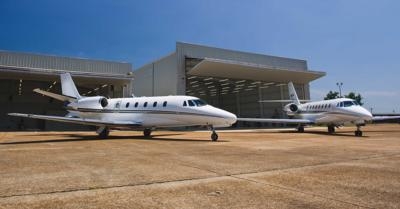Fri, Mar 01, 2024
Air Resources Board Solution Would Do Little to Bolster SAF Use In-State, While Adding Additional Cost Burden
The National Business Aviation Association published a letter to the California Air Resources Board, taking issue with a proposed regulation that they believe would be counterproductive to rolling out increasing proportions of sustainable fuel.

The Board, or CARB as many motor enthusiasts know them, makes up the state's emissions regulator, approving and disapproving a whole slate of things relating to intake & emissions across anything with a combustion engine. CARB wants to regulate jet fuel used for flights within the state as an 'obligated fuel' under the Low Carb Fuel Standard program, a change that would "raise the cost of jet fuel without inducing additional sustainable Aviation Fuel production or use" - a proposal the NBAA says ought to be withdrawn. In its place, they encourage CARB to "regulate jet fuel and instead establish a joint CARB-industry working group to explore alternative solutions to increase SAF production and use."
The NBAA goes through to make their case based on the numbers, citing things like the 5% of national and 4.1% of state GDP derived from aviation. The NBAA says that the industry actually exerts "outsize economic impact relative to its share of emissions", since it only really accounts for 2.6% of greenhouse gasses generated throughout the country.
Counting how many it employs, and its $194 billion economic impact, hamfisted efforts to accelerate the adoption of Sustainable AvFuels could well cause more harm than good. The aviation industry as a whole has continually presented itself as enthusiastic and eager to work with stakeholders to lessen the environmental impact it has on the world, to the point of setting ambitious net-zero goals and continued quality assurance programs to help every entity in the fold improve its ecological friendliness. As such, it would be easiest for everyone to simply work with the lot instead of aggressively, and antagonistically regulate them.
"The business aviation industry and CARB have the same goal here: to reduce carbon emissions through safe alternative fuels,” said Phil Derner, NBAA’s regional director for the Western region. “We urge CARB to work in partnership with the industry to achieve our common objectives.”
More News
“While legendary World War II aircraft such as the Corsair and P-51 Mustang still were widely flown at the start of the Korean War in 1950, a new age of jets rapidly came to >[...]
Decision Altitude (DA) A specified altitude (mean sea level (MSL)) on an instrument approach procedure (ILS, GLS, vertically guided RNAV) at which the pilot must decide whether to >[...]
Aero Linx: National Aviation Safety Foundation (NASF) The National Aviation Safety Foundation is a support group whose objective is to enhance aviation safety through educational p>[...]
Also: Cal Poly Aviation Club, $$un Country, Arkansas Aviation Academy, Teamsters Local 2118 In response to two recent general aviation accidents that made national headlines, more >[...]
“The FAA is tasked with ensuring our skies are safe, and they do a great job at it, but there is something about the system that is holding up the medical process. Obviously,>[...]
 Aero-News: Quote of the Day (04.28.25)
Aero-News: Quote of the Day (04.28.25) ANN's Daily Aero-Term (04.28.25): Decision Altitude (DA)
ANN's Daily Aero-Term (04.28.25): Decision Altitude (DA) ANN's Daily Aero-Linx (04.28.25)
ANN's Daily Aero-Linx (04.28.25) Airborne-Flight Training 04.24.25: GA Refocused, Seminole/Epic, WestJet v TFWP
Airborne-Flight Training 04.24.25: GA Refocused, Seminole/Epic, WestJet v TFWP Aero-News: Quote of the Day (04.29.25)
Aero-News: Quote of the Day (04.29.25)



